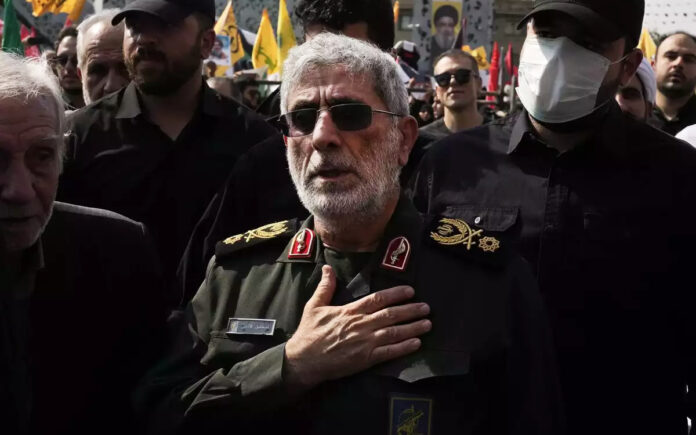Tehran: Iranian commander Esmail Qaani made his first public appearance in weeks on Tuesday, attending the funeral of General Abbas Nilforoushan, a senior member of Iran’s Revolutionary Guards. Nilforoushan was killed last month in an Israeli strike on Beirut, along with Hezbollah leader Hassan Nasrallah.
The funeral, held at Imam Hossein Square in central Tehran, was broadcast live on state television. Thousands gathered for the procession, carrying yellow Hezbollah banners, along with Iranian and Palestinian flags. The crowd chanted “Death to Israel” as the casket of Nilforoushan was paraded through the streets.
Qaani, head of the Quds Force, the Revolutionary Guards’ elite unit responsible for overseas operations, had been absent from public view for several weeks. His absence fueled speculation in some media outlets that he had been targeted in an Israeli airstrike in Lebanon. Clad in the Revolutionary Guards’ green uniform, Qaani’s presence at the funeral put those rumors to rest.
Memorial services for Nilforoushan had already been held in Iraq on Monday. His remains will be moved to various cities in Iran, including Qom and Mashhad, before being buried in his hometown of Isfahan on Thursday.
The Iranian foreign ministry declared on Monday that the Islamic Republic would use “all its capacities” to hold Israel accountable for Nilforoushan’s death. Iran had already launched 200 missiles at Israel on October 1 as retaliation for the deaths of Nilforoushan and Nasrallah. The missile strike marked only the second direct attack on Israel by Iran, further escalating tensions between the two nations.
Also Read | Harris Maintains Narrow 45%-42% Lead Over Trump in Tight U.S. Presidential Race, Reuters/Ipsos Poll Shows
The attack also came in retaliation for the killing of Hamas leader Ismail Haniyeh, who had been in Tehran in July to attend the inauguration of Iran’s president when he was killed.
In response to the Iranian missile strike, Israeli Defence Minister Yoav Gallant warned that Israel’s retaliation would be “deadly, precise, and surprising.”
Meanwhile, Iran has intensified diplomatic efforts to bring about a ceasefire in Lebanon and Gaza. During a visit to Baghdad, Iranian Foreign Minister Abbas Araghchi stated that while Iran is “fully prepared for a war situation,” the country seeks peace, not war.
Earlier in April, Iran launched a barrage of missiles and drones at Israel, retaliating for an Israeli strike on Iran’s consulate in Damascus.



